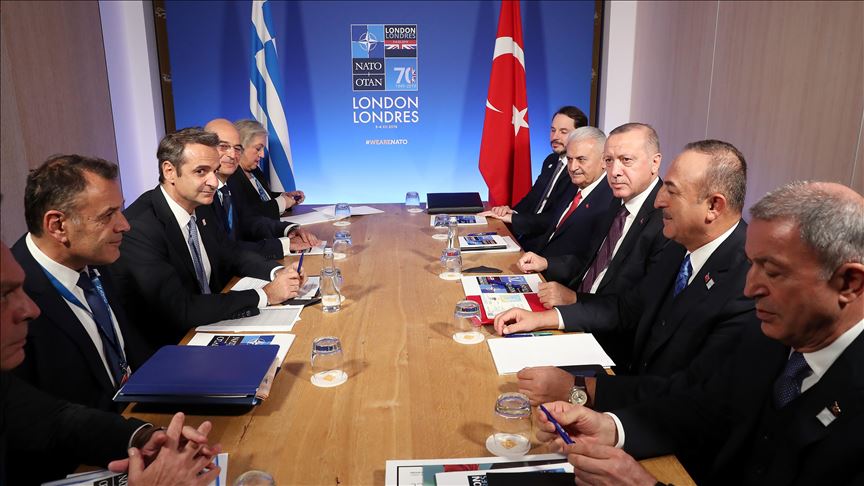« This summer, for the first time in many years, the omens concerning Greek-Turkish relations are particularly gloomy. There are many objective reasons why Turkey causing a heated incident is not the most likely scenario; however, the accumulation of largely unwarranted anger across the Aegean mixed with President Recep Tayyip Erdogan’s arrogant insecurity is causing justified concern and alarm » says Constantinos Filis in Kathimerini.
So long as the situation in Ukraine remains tense, it is key for NATO to maintain its cohesion. The unity of the transatlantic Alliance is challenged by Turkey’s reaction to the potential membership of Sweden and Finland but, at the same time, this opposition renders less likely a rupture in NATO’s southeastern flank. It therefore seems that Erdogan’s real aim is not to open a rift with Washington but rather to grab the attention of Joe Biden and bargain with the American president before Turkey’s elections.
Where does Greece fit in all that? On one hand, there is the strategic relationship developed with the US. From Turkey’s perspective, the Americans do not want to give Greece the impression that they failed to stop Turkey from triggering a crisis. On the other, Ankara expects that the constant pressure on Athens will force it to ask for Washington’s involvement and thereby open a channel of communication given that an incident between two NATO allies would inevitably be treated as top priority in need of direct intervention.
Meanwhile, Erdogan enjoys dwindling domestic support ahead of elections in Turkey. Here lies one of the most pressing areas of concern in Greek-Turkish relations. Erdogan finds himself in an unprecedented position. After dominating Turkish politics for two decades, he is polling behind rival candidates. The strong card that cemented his rule, the Turkish economy, has become his Achilles’ heel. Furthermore, his prolonged stay in power and autocratic style, as well as his narrowing circle of trusted officials, seem to be reinforcing his divorce from political, economic and social reality. Erdogan’s insistence on cutting interest rates amid rampant inflation speaks volumes about him being out of touch with real events and the needs of his people.
This combination is problematic because, as in the case of Russian President Vladimir Putin, rationalism is placed on the back burner for the sake of a worldview that is deeply rooted in the “glorious past,” the need to “correct” historical events and the leaders’ desire to leave their mark on history. Faced with a possible electoral defeat and given that the Turkish economy is at risk of bankruptcy, Erdogan will naturally turn elsewhere for a success that will allow him to score points at home and rally a diverse audience of Islamists and Kemalists that is glued together by nationalism. Each time he launched an offensive in Syria, Erdogan’s poll numbers went up – and that was as the economy prospered. Also, after 2015, when he chose to target the Kurds and, of course, after the failed coup of 2016, Erdogan was able to win elections and the referendum on the back of intense polarization at home – which has now peaked – and convenient enemies outside Turkey.
Faced with a possible electoral defeat and given that the Turkish economy is at risk of bankruptcy, Erdogan will naturally turn elsewhere for a success that will allow him to score points at home
The Turkish leadership has regrettably adopted the extreme views held by the Kemalist deep state regarding the Aegean and Greece. Meanwhile, hostility toward Athens and Nicosia cuts across the political system. Inside Turkey, there is an organized campaign to cultivate and sustain an anti-Greek mood and an anything-goes reaction. Erdogan has of late adopted the long-standing doctrine of the Kemalist establishment which likes to portray Greece as the spoiled child of the West that is acting on behalf of American interests and which could under certain conditions be used as a battering ram against Turkey. Demonizing Athens however is as convenient as launching a military campaign against it is complicated. This certainly serves as a deterrent for Ankara.
On the field, the range of Turkey’s moves is more or less predictable (the ultimate aim being making Greece take responsibility for any escalation of tensions): conducting seismic surveys in sea areas that have not been demarcated (the Rhodes-Karpathos-Kastellorizo triangle seems to draw most of the interest here), sending a drillship inside Cyprus’ exclusive economic zone (EEZ), activating the Turkey-Libya memorandum, launching a tender for surveys in the Libyan continental shelf, triggering a standoff over migrant flows, and engaging in provocations even by Turkish fishing vessels, continuing Greek airspace violations using conventional and hybrid means. The frequency of hybrid (psychological) operations will intensify in a bid to wear Athens down and make a compromise more likely.
On the diplomatic level, on top of making the case to an international audience for the demilitarization of eastern Aegean islands – also insisting that its status is tied to Greek sovereignty over these islands – Turkey is mulling sending a letter to the United Nations promoting the country’s arguments and claims in the Aegean. Turkish diplomats are digging into past cases that could be interpreted as supportive to their cause in a bid to construct arguments regarding maritime zones. All that will require caution.
Also, Greece will have to examine if such an action constitutes a violation of the Berne Protocol (submitting coordinates will amount to a unilateral delimitation) and if the country’s interests are better served by indirect negotiation because each time Athens will need to respond to increasingly specialized claims put forward by the other side.
Constantinos Filis is the director of the Institute of Global Affairs and associate professor at the American College of Greece.
Kathimerini, June 20, 2022, Constantinos Filis

